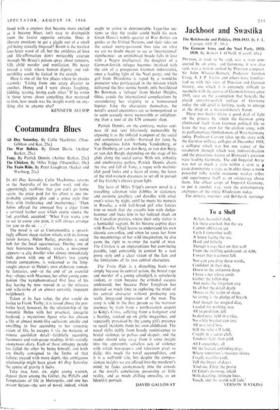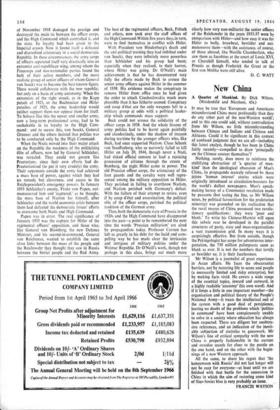Jackboot and Swastika
The German Army and the Nazi Party, 1933- 1939. By Robert J. O'Neill. (Cassell, 63s.) PRussiA, it used to be said, was a state con- quered by an army. and Germany, it was also said, was a nation unified by Prussian conquest. Sir John Wheeler-Bennett, Professor Gordon Craig, A. J. P. Taylor and others have familiar- ised us with this view of Prussian and German history; one which it is extremely difficult to reconcile with the course of German history since 1945, save on the assumption that beneath the placid .spiessbiirgerlich surface of Germany today the old devil is lurking, ready to emerge at the drop of a Generaloberst's baton.
These two books throw a good deal of light on the process by which the German army eliminated itself from German political life to leave the way open for the civilian army, with its parliamentary Ombudsman, of West Germany today. Professor Carsten takes up the story with the German military collapse of December 1918, a collapse which was but one aspect of the revolution through which war, industrialisation and the precarious nature of Bismarck's creation were leading Germany. The old Imperial Array was not so much a state within a state at I caste dominating a state, as in older times a more powerful tribe would overcome weaker tribes and superimpose itself as an aristocracy above them. The officer corps of Imperial Germany, to put it another way, were the contemporary analogues of the white Rhodesians today.
The defeats, mutinies and Bolshevik uprisings
of November 1918 damaged the prestige and destroyed the main tie between the officer corps, and the High Command which controlled it, and the state. Its loyalty had been given to the Imperial crown. Now it found itself a defeated and discredited aristocracy in a social democratic Republic. In these circumstances, the army corps of officers separated itself very drastically into an extremist anti-republican wing, among whom the Freecorps and neo-nationalist parties found the bulk of their active members, and the more realistic group of senior officers of whom General von Seeckt was to become the best-known figure. These would collaborate with the new republic; but only on a basis of army autonomy. When the extremists of the right struck, as in the Kapp putsch of 1923, or the Buchnecker and Hitler putsches of 1923, the army leadership would neither support them nor oppose them for itself. To behave like this the newer and smaller army, now a long-term professional army, had to be unshakable in its loyalty to the High Com- mand : and to secure this, von Seeckt, General Groener and the others insisted that politics was to be conducted only by the High Command.
When the Nazis moved into their major attack on the Republic the weakness of the politicising elite of officers, now led by General Schleicher, was revealed. They could not govern like Praetorians, since their own efforts had de- Praetorianised (to put it very crudely) the army. Their opponents outside the army had achieved a mass base of power, against which they had no remedy but cleverness, and access to the Reichspresident's emergency powers. In January 1933 Schleicher's enemy, Franz von Papen, out- manoeuvred him and 'captured,' as he thought, the mass base of Nazism for himself, after Schleicher and the world economic crisis between them had defeated the democratic forces' efforts to overcome both Nazis and High Command.
Papen was in error. The real significance of January 1933 was the capture for Hitler of the regimental officers' opposition, and those who, like General von Blomberg, the new Defence Minister, and his second-in-command, General von Reichenau, wanted to establish the same close links between the mass of the people and the Reichswehr they thought they saw in Russia between the Soviet people and the Red Army.
The best of the regimental officers, Beck, Fritsch and others, now took over the staff offices of the High Command.Within five years they, in turn, were to find themselves in conflict with Hitler.
With President von Hindenburg's death and the anti-political training they had imbibed under von Seeckt, they were infinitely more powerless than Schleicher and his group had been; especially when they realised, to their horror, where Hitler was going. Dr O'Neill's main achievement is that he has documented very fully the efforts made by Beck to arouse the senior army officers against Hitler in the summer of 1938. His evidence makes the conspiracy to remove Hitler from office once he had given the order to attack Czechoslovakia much more plausible than it has hitherto seemed. Conspiracy and coup d'etat are the only weapons left to a military group at odds with a political leader- ship which commands mass support.
Beck could not arouse the solidarity of the officer corps in 1938. And the whole lessons of army politics had to be learnt again painfully and clandestinely, under the shadow of treason during wartime by the younger officers who, like Beck, had once supported Nazism. Claus Schenk von Stauffenberg, who so narrowly failed to kill Hitler on July 20, 1944, though never a Nazi, had risked official censure to lead a rejoicing procession of citizens through the streets of Bamberg, the night Hitler came to power. The old Prussian officer corps, the aristocracy of the foot guards and the cavalry were well repre- sented among the military opposition to Hitler. They perished in failing to overthrow Nazism, and Nazism perished with Germany's defeat With the failure of their attempt to revive, even if by coup d'etat and assassination, the political role of the officer corps, perished the political tradition of the German army.
Thus, both the democratic state of Prussia in the . 1920s and the High Command have disappeared into the past—a point to be remembered the next time the words 'Prussian militarism' are aired by propagandists today. Professor Carsten has left us greatly in his debt for the lucid and com- pelling way he has made clear the intricacies and intrigues of military politics under the Weimar Republic. Dr O'Neill's work, though not perhaps in this class, brings out much more
clearly how very non-militarist the senior officers of the Reichswehr in the years 1933-37 were by comparison with Hitler—and how easy it was for Hitler to bully, browbeat, bewilder and out- manoeuvre them—with the assistance, of course, of those abroad, like Neville Chamberlain, who saw them as Jacobites at the court of Louis XVI, or Churchill himself, who tended to talk of Prussia as though Frederick the Great or the first von Moltke were still alive.
D. C. WATT































 Previous page
Previous page